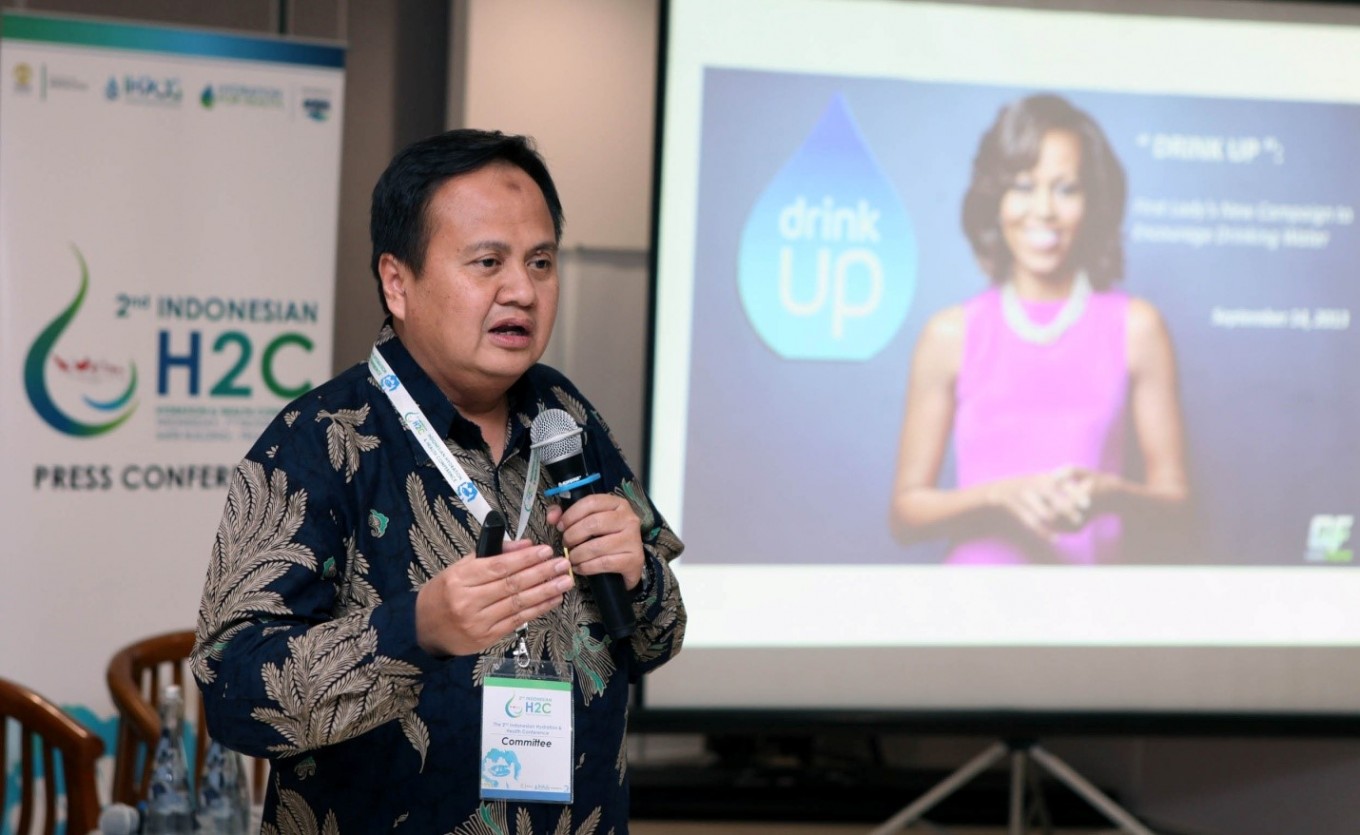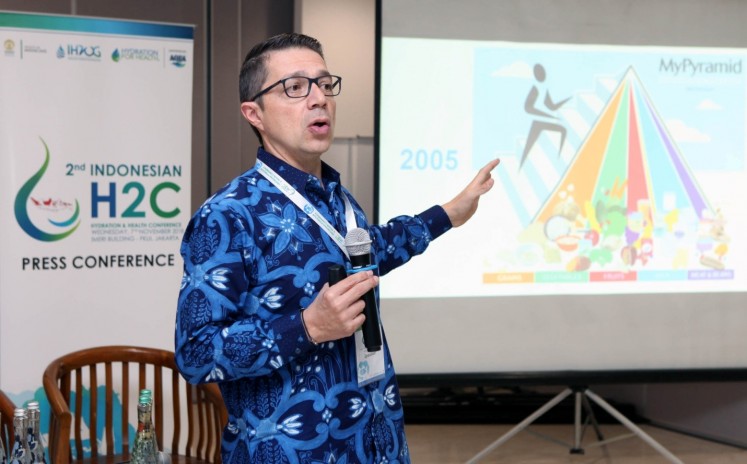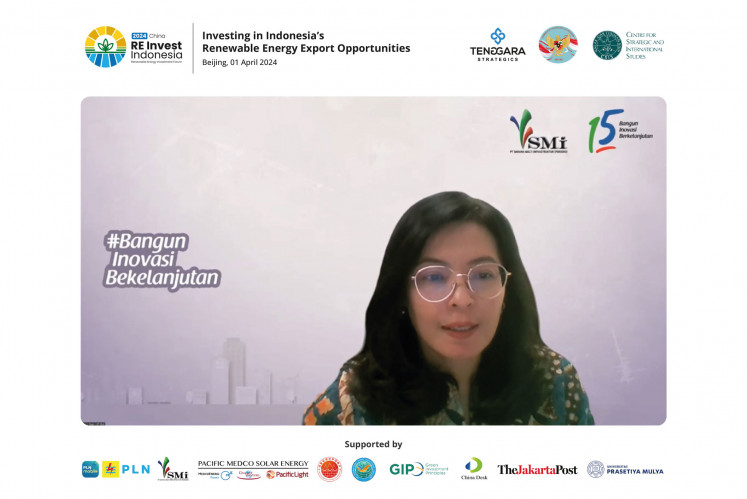Conference seeks to mitigate global low hydration problem
The second Indonesian Hydration and Health Conference (IH2C), organized by Indonesian Hydration Working Group (IHWG) – Faculty of Medicine Universitas Indonesia and PT Tirta Investama (Danone-AQUA), sought to mitigate the global prevalence of low hydration among people by allowing international participants to exchange insights on effective behavior change programs.
Change Size
 Let’s talk about hydration: Chairman of the Indonesian Hydration Working Group (IHWG) Budi Wiweko speaks at the Second Indonesian Hydration & Health Conference (IH2C) at the University of Indonesia’s Medical School in Salemba, Central Jakarta on Wednesday. The conference, which ran from Nov. 6 to 8, discussed how to mitigate the global problem of low hydration. (JP/Arief Suhardiman)
Let’s talk about hydration: Chairman of the Indonesian Hydration Working Group (IHWG) Budi Wiweko speaks at the Second Indonesian Hydration & Health Conference (IH2C) at the University of Indonesia’s Medical School in Salemba, Central Jakarta on Wednesday. The conference, which ran from Nov. 6 to 8, discussed how to mitigate the global problem of low hydration. (JP/Arief Suhardiman)
The Jakarta Post/Jakarta
The second Indonesian Hydration and Health Conference (IH2C), organized by Indonesian Hydration Working Group (IHWG) – Faculty of Medicine Universitas Indonesia and PT Tirta Investama (Danone-AQUA), sought to mitigate the global prevalence of low hydration among people by allowing international participants to exchange insights on effective behavior change programs.
The IHWG and Danone-AQUA conducted the event from Nov. 6 to 8, featuring medical experts and nutritionist from across the globe, such as the United States’ Arizona State University professor Stavros Kavouras, France’s Paul Sabatier University School of Medicine professor Ivan Tack, the United Kingdom’s Joan Gandy and China’s Guansheng Ma, among others, to explore the problem.
The conference featured research paper and data presentations highlighting mineral water as an important macronutrient and how to boost public awareness on the importance of healthy hydration.
According to Tack, human bodies are 60 to 65 percent water. We need water to excrete toxins through urine and sweat, to manage our body temperature as well as to boost cognitive function and preserve kidney function.

Kavouras revealed in his presentation on Nov. 7, that approximately 500 million adults worldwide were not adequately hydrated. He also said that around 70 to 80 percent of Indonesians were properly hydrated by getting the minimum daily intake of mineral water. He was quick to add that although most Indonesians were properly hydrated, they suffered from yet another problem: drinking too many sugary drinks on a daily basis, that can lead to numerous noncommunicable diseases such as diabetes and cardiovascular problems.
This year, Chinese academics and practitioners have been invited to the conference to explore ways in which they can work with Indonesia to mitigate hydration problems in their countries, considering that both countries have a large population.
Low hydration can have dire health consequences, including for cognition function and kidney health, according to Tack.
“Especially recently, when more and more people are eating lots of Western food heavy in protein, sugar and salt, which increase the amount of bodily waste that needs to be excreted through urine. If you are someone who does not drink enough, you can’t excrete waste through urine, resulting in kidney stones, urinary tract infections and a saturation of bodily waste inside your system,” Tack explained.
Kavouras said people should drink at least eight glasses of mineral water every day, adding that individuals’ intake needs varied according to temperature and activity intensity. Journalists who have to move around in hot weather, for instance, require additional mineral water intake to hydrate their bodies, he explained.
“That’s why, pay attention to your own biomarkers. If you’re thirsty, or if the color of your urine gets dark, that is your body’s way of telling you that you need to drink mineral water,” he advised.
According to IHWG chairman Budi Wiweko, although most Indonesians are properly hydrated, we should not be complacent in campaigning for adequate hydration. The IHWG itself was established in 2012, conducting research studies and education programs as well as advocacy aiming at encouraging people to nourish themselves properly with mineral water to achieve healthy hydration
Awareness about the importance of hydration among Indonesians varies, depending on their location and socioeconomic status as well as clean water access, said Budi Wiweko, who is also an obstetrician and gynecologist.
In order to improve awareness of healthy hydration and to shape a healthy lifestyle, IHWG with Danone-AQUA and the Health Ministry have developed a research, advocacy and public education program called “Ayo Minum Air” (AMIR) or “Let’s Drink Water”.
“Through this AMIR program, we’re trying to introduce a healthy drinking habit to elementary school students by providing glasses and water during lunch at school. Students will acquire the habit if they do the same thing at home as well. So, the cooperation between teachers and parents is crucial,” Budi said.
Budi highlighted that effective collaboration was needed to increase awareness and change behaviors in staying hydrated. “The government, academics, communities and the private sector need to collaborate continuously to educate the public and encourage healthy drinking habits,” he said, adding that students concentrated better at school when they were hydrated. “That’s why it’s important to make an early intervention to instill the habit in children.”
Moreover, according to credible publication, good hydration can also improve visual function and reduce the risk of noncommunicable diseases, such as diabetes and kidney stones.
“Danone-AQUA, in line with its social mission, supports the IHWG and University of Indonesia and also invites other universities in Indonesia to participate in raising awareness about hydration through education, research and advocacy,” said Tria Rosemiarti, Danone-AQUA Hydration Science Director. Tria added that they had conducted the AMIR program in a number of cities across Indonesia.









